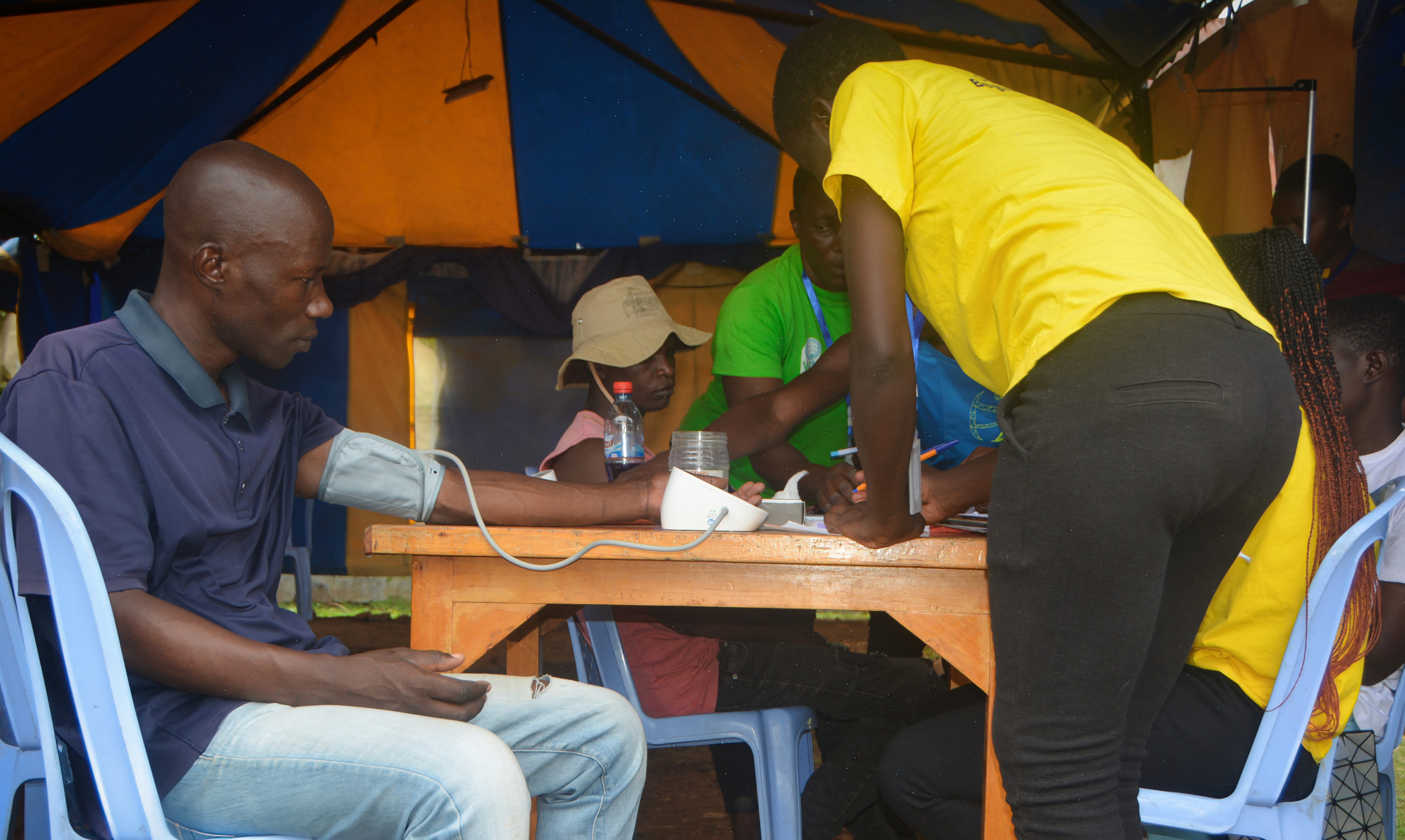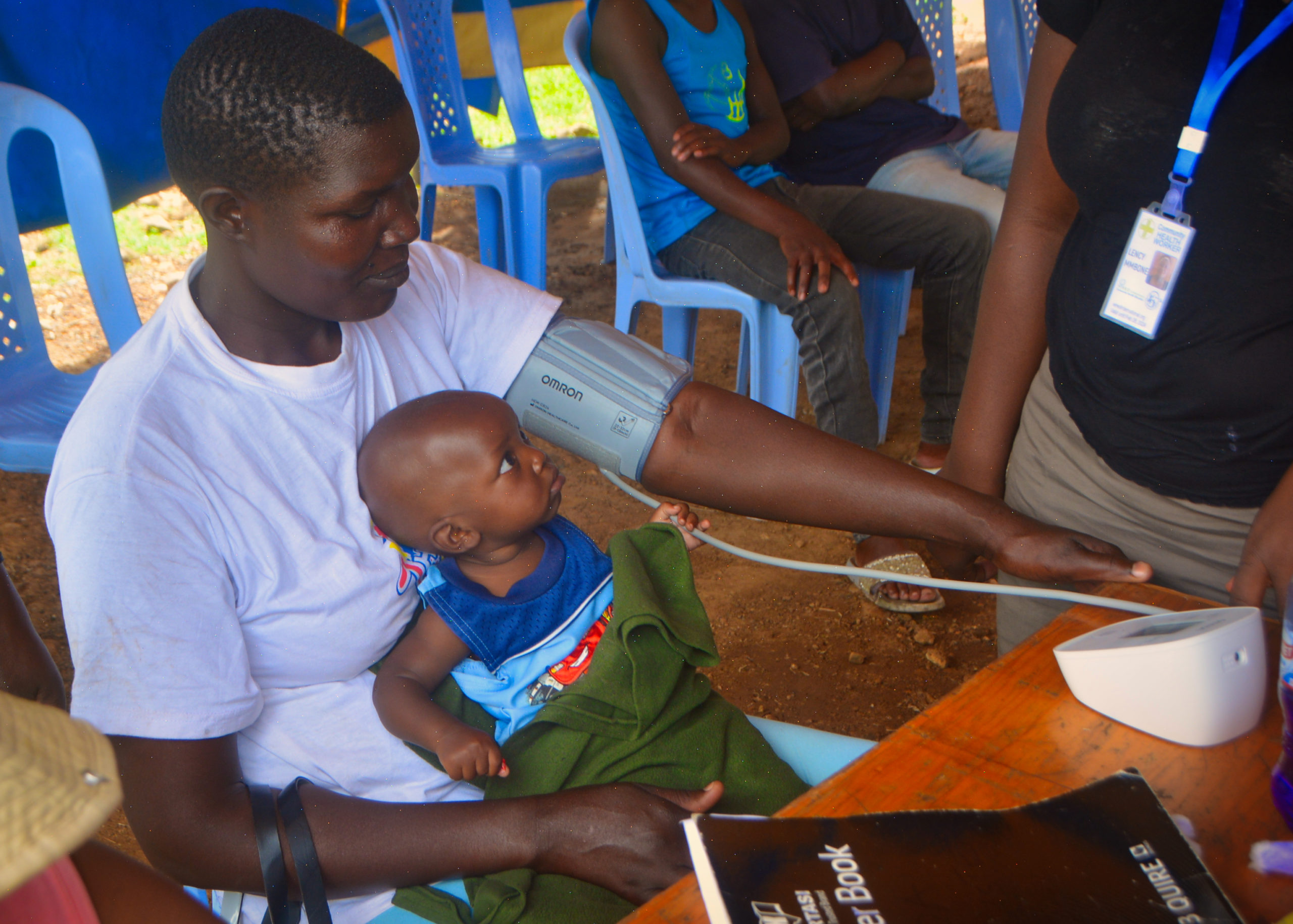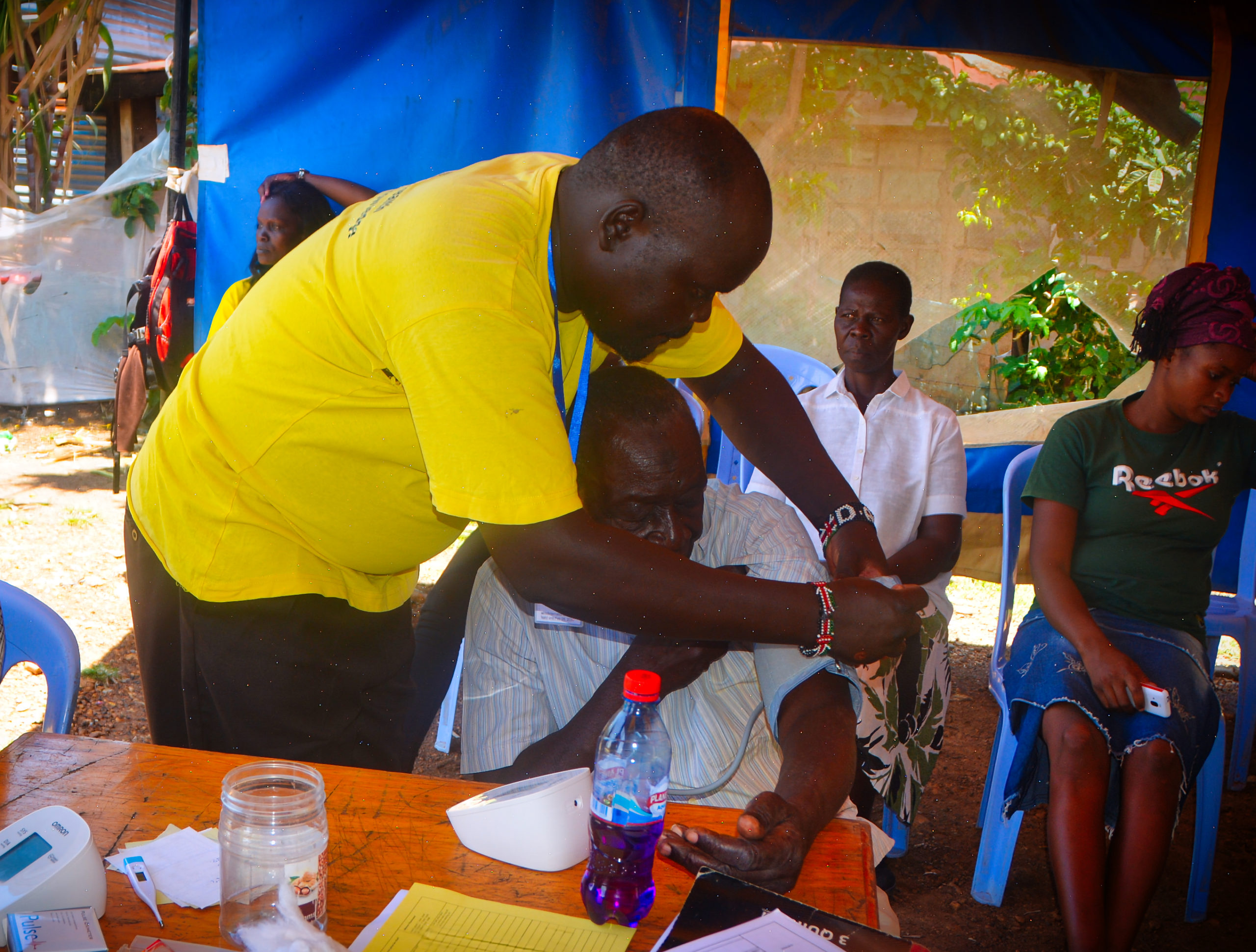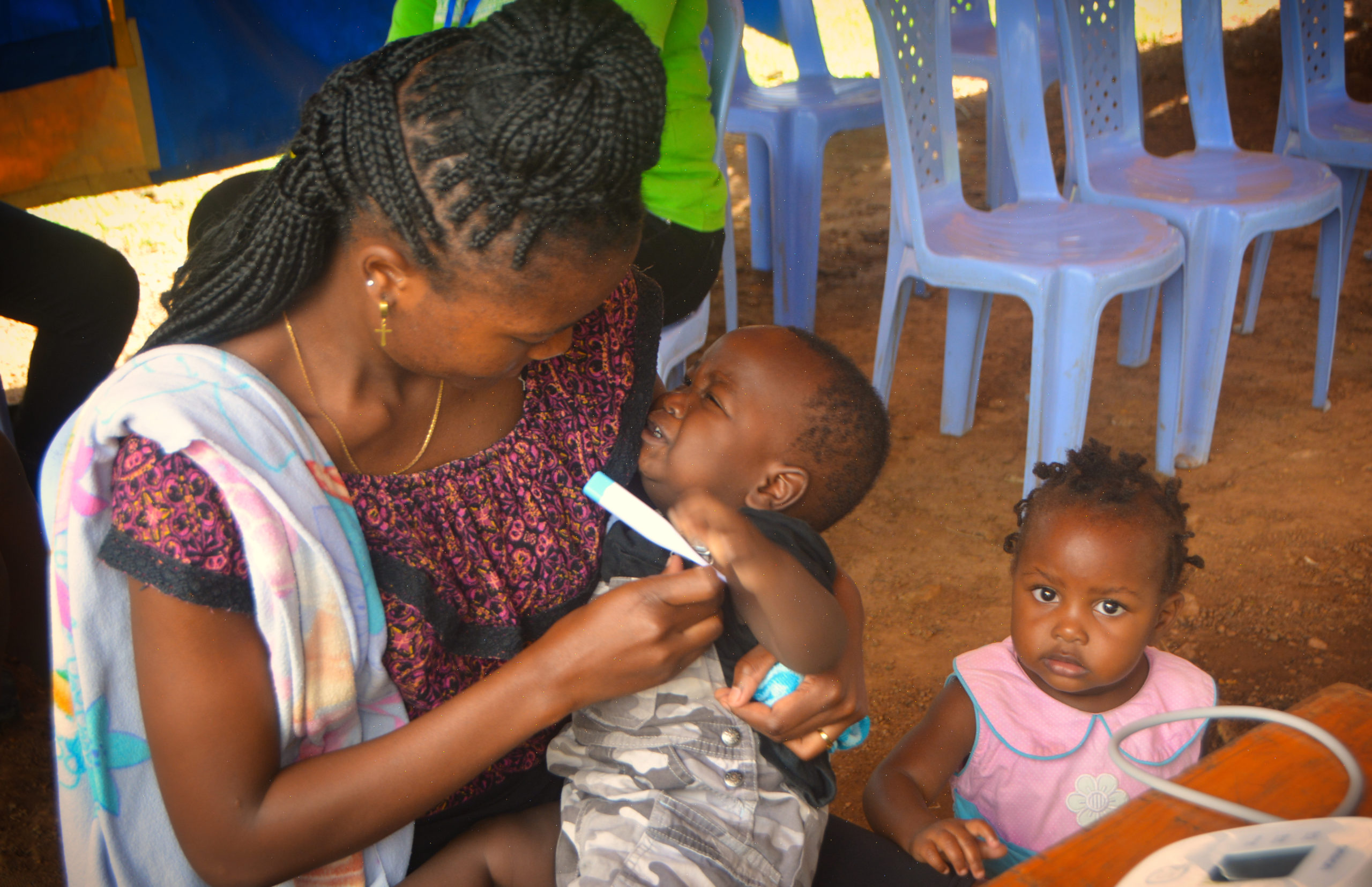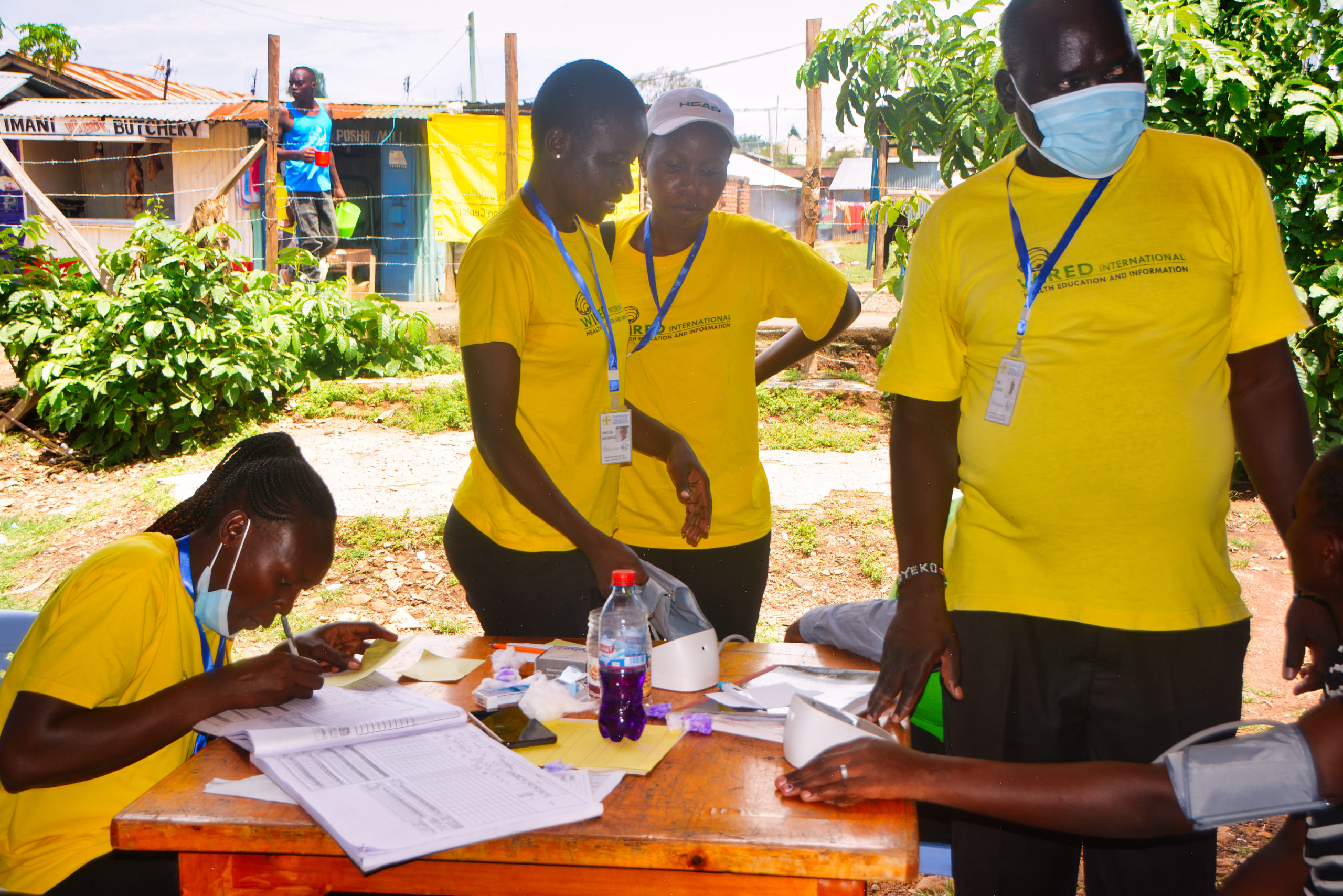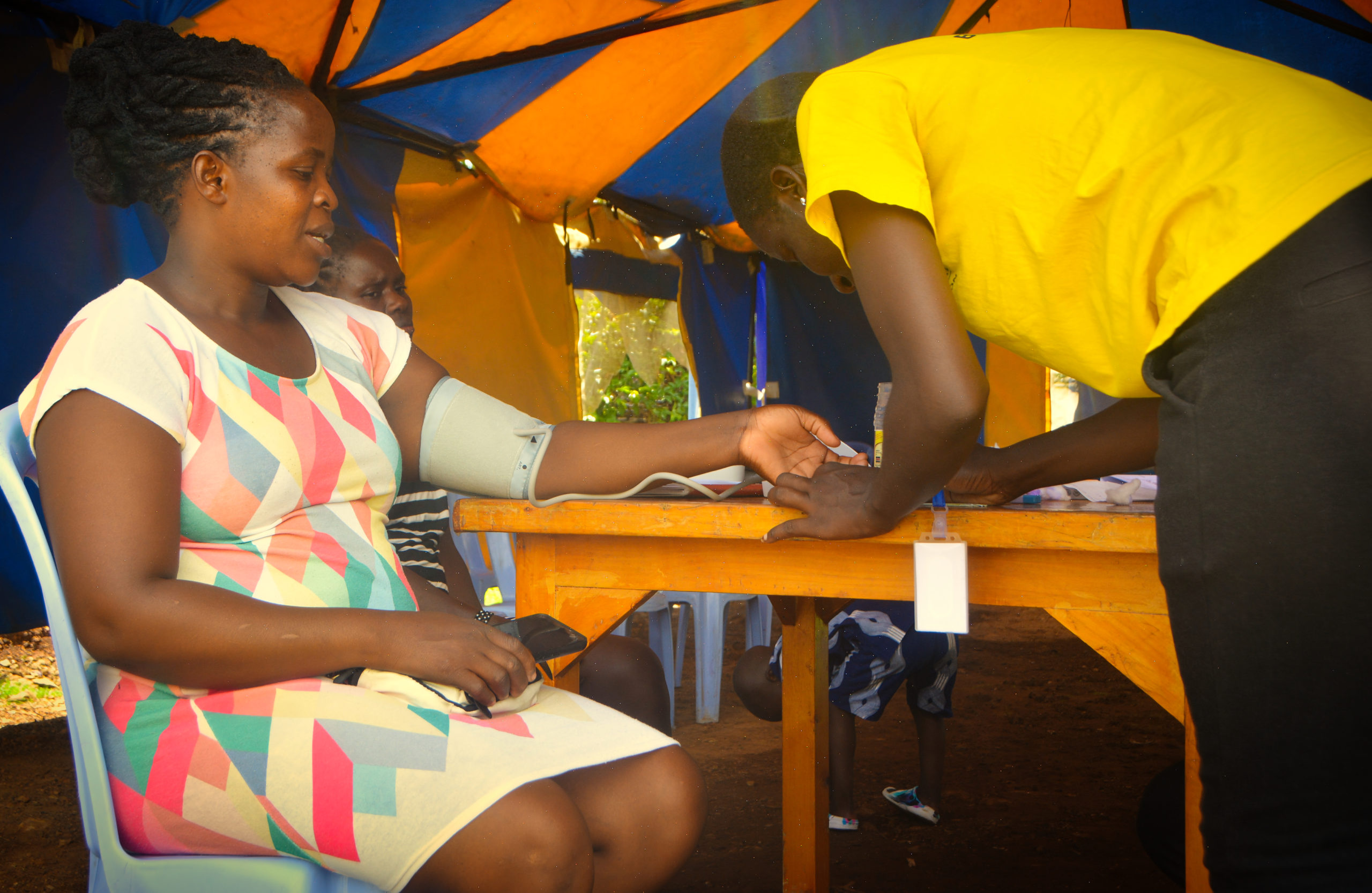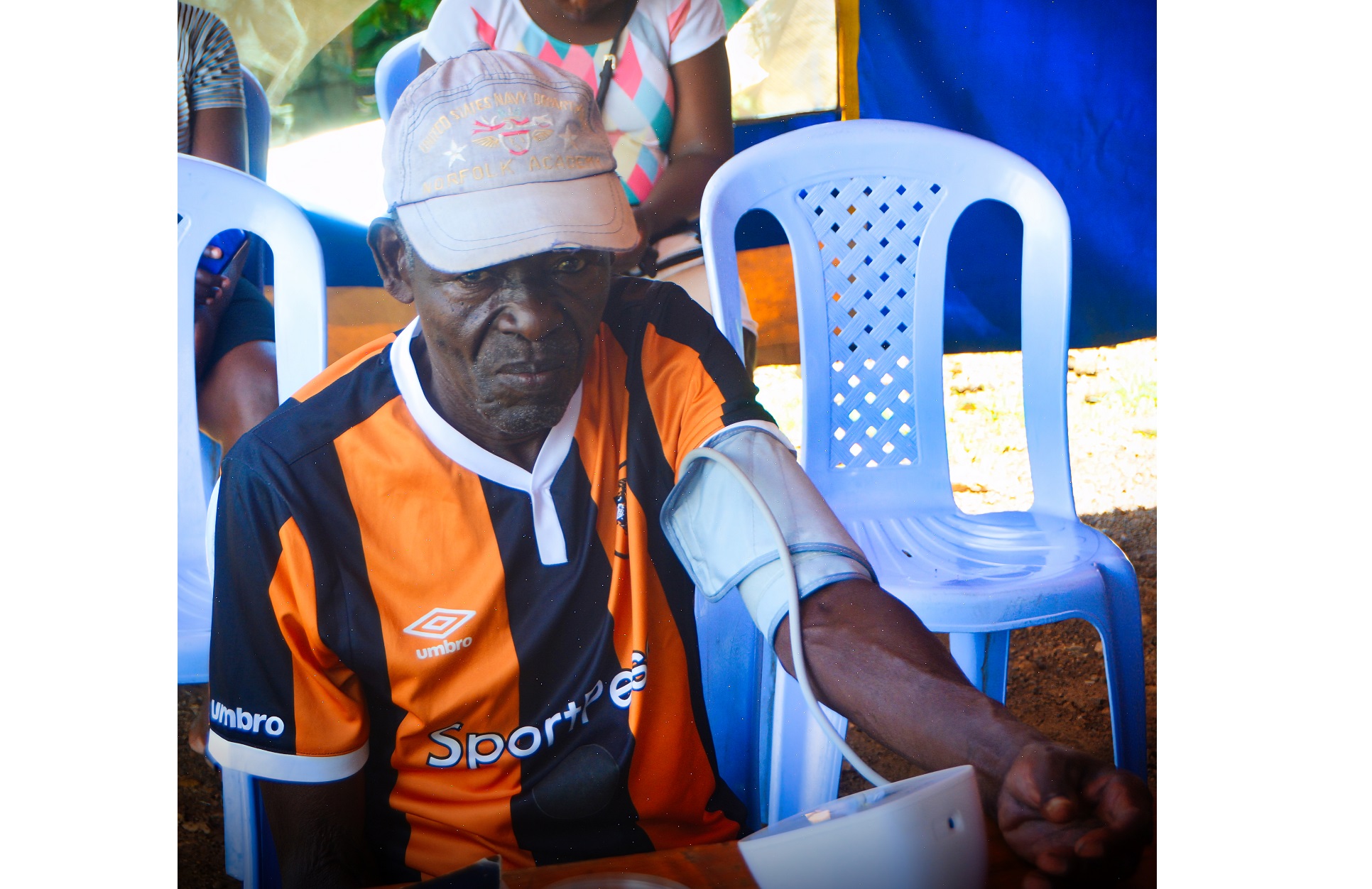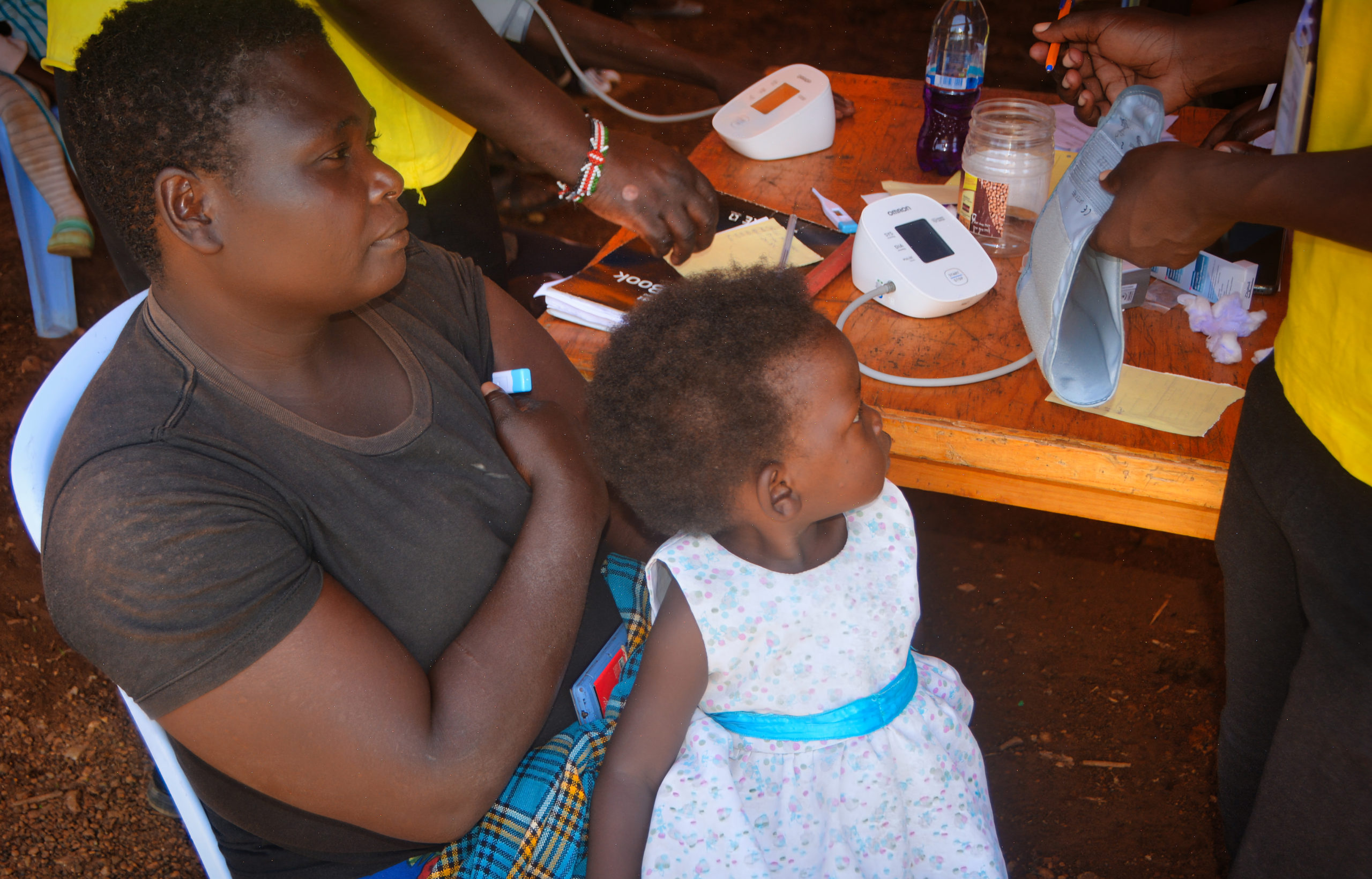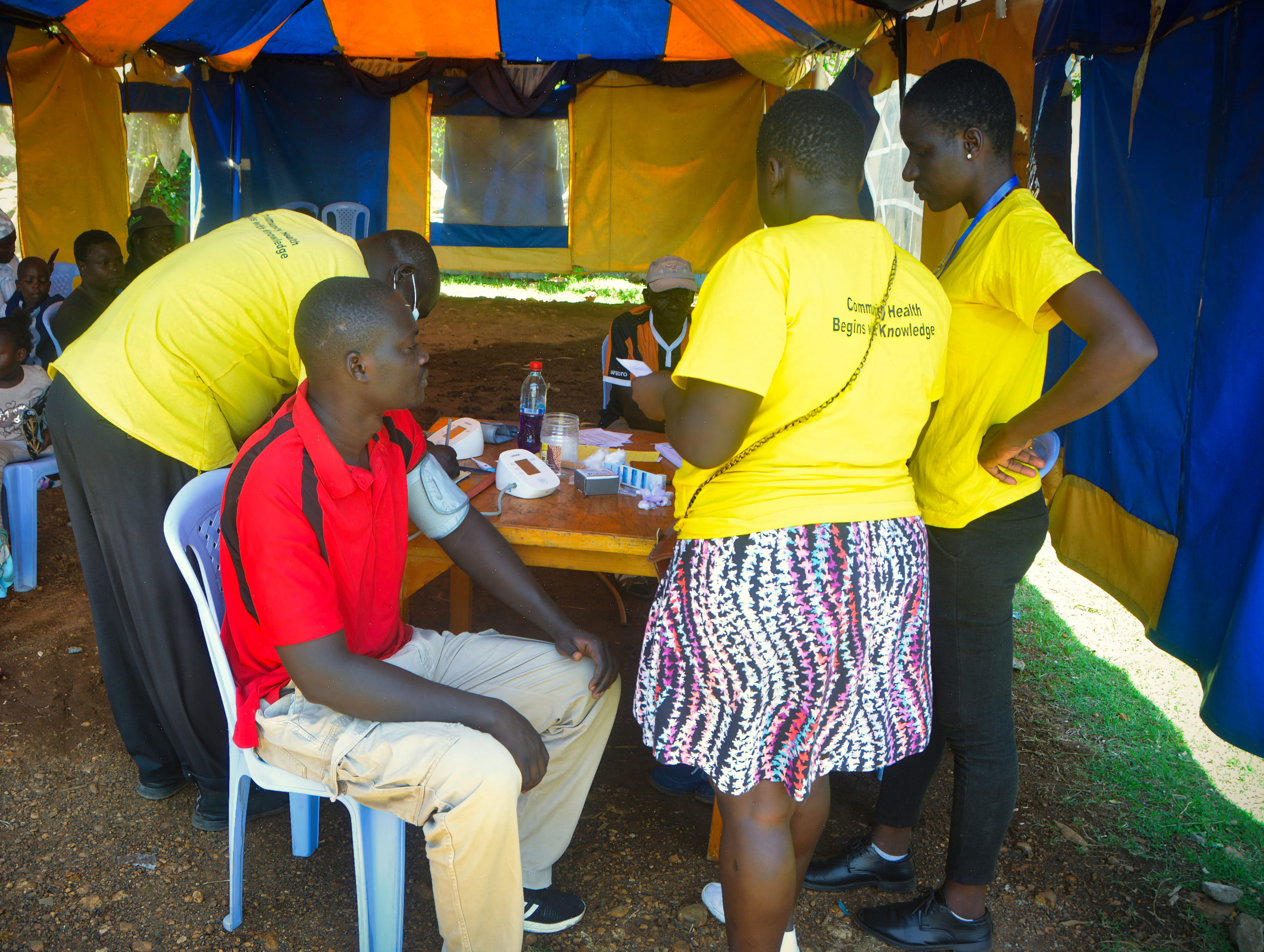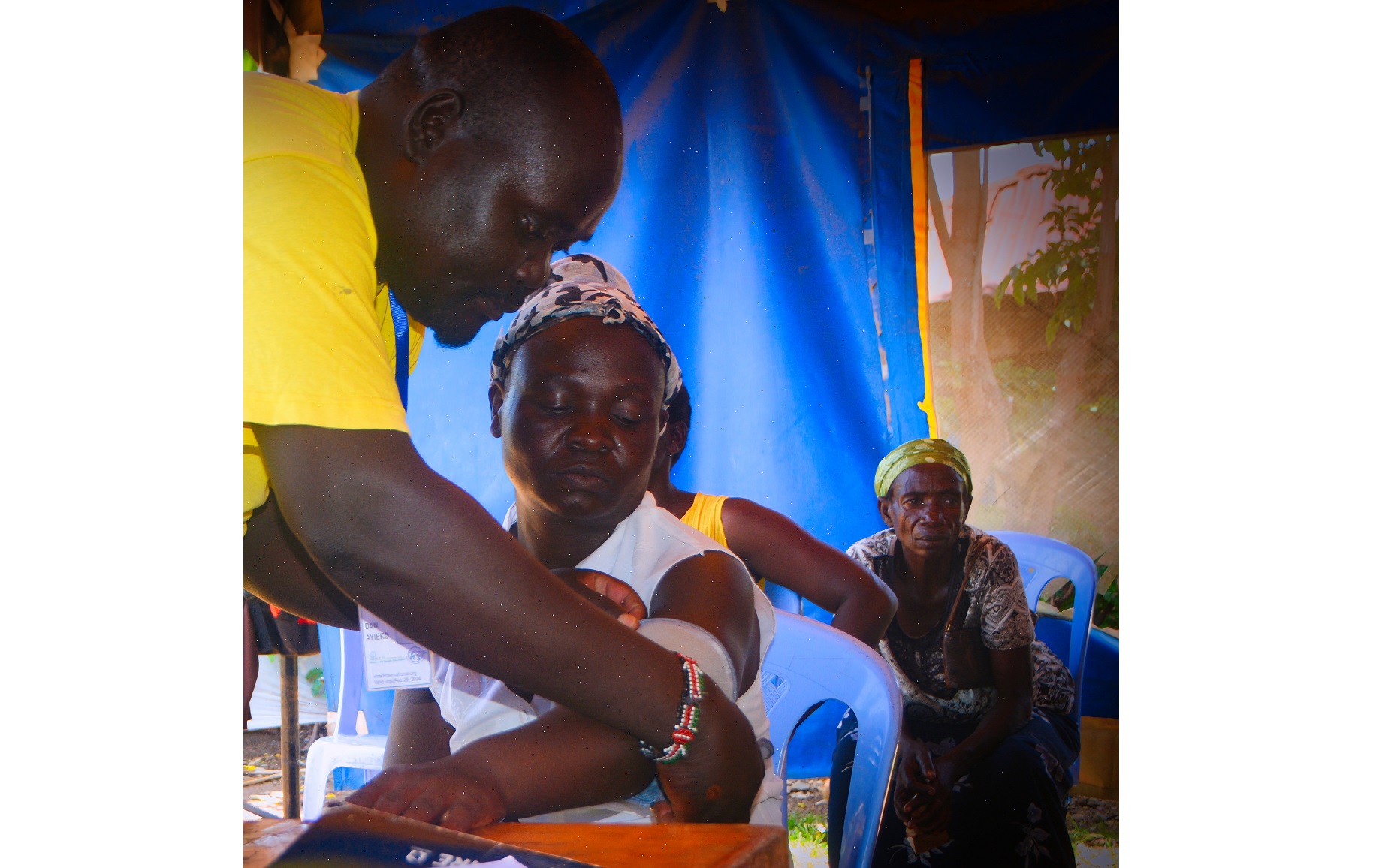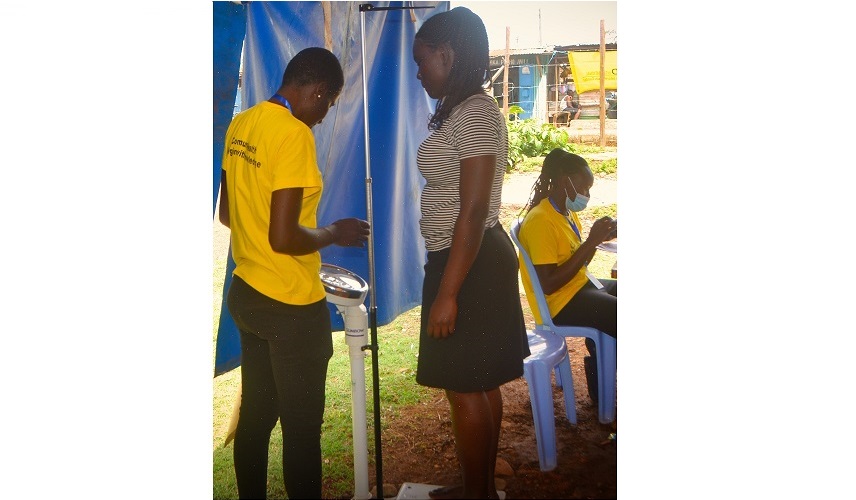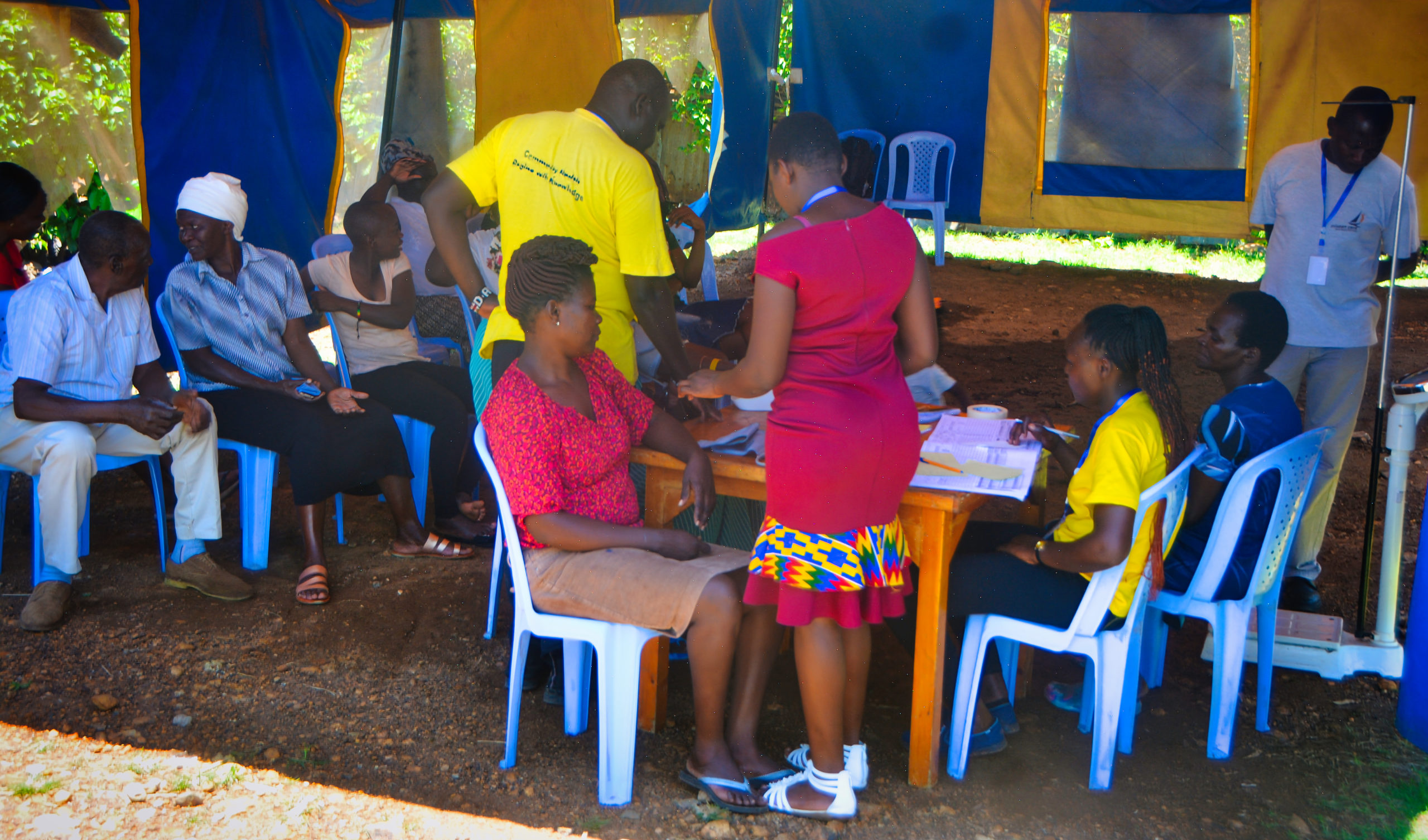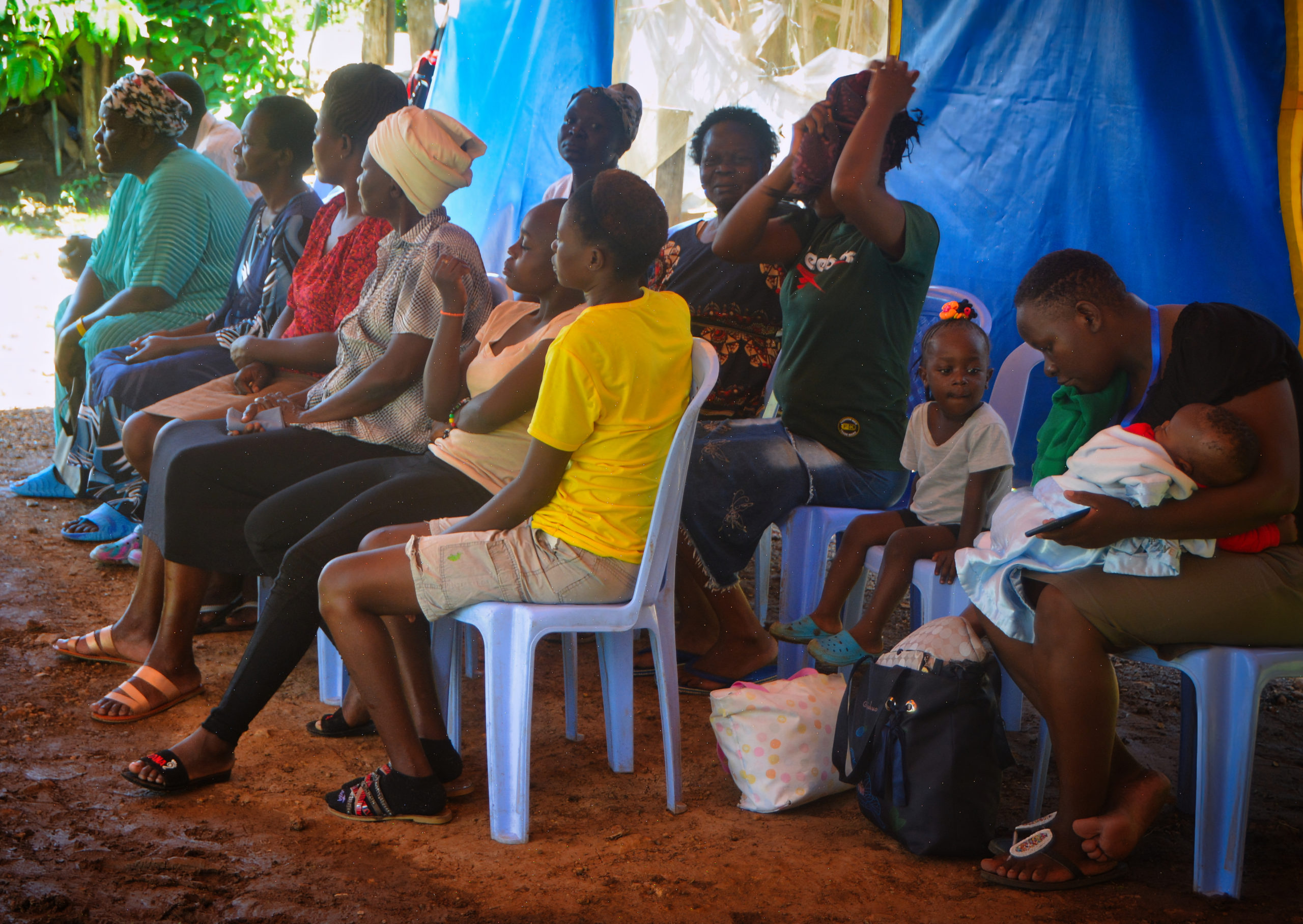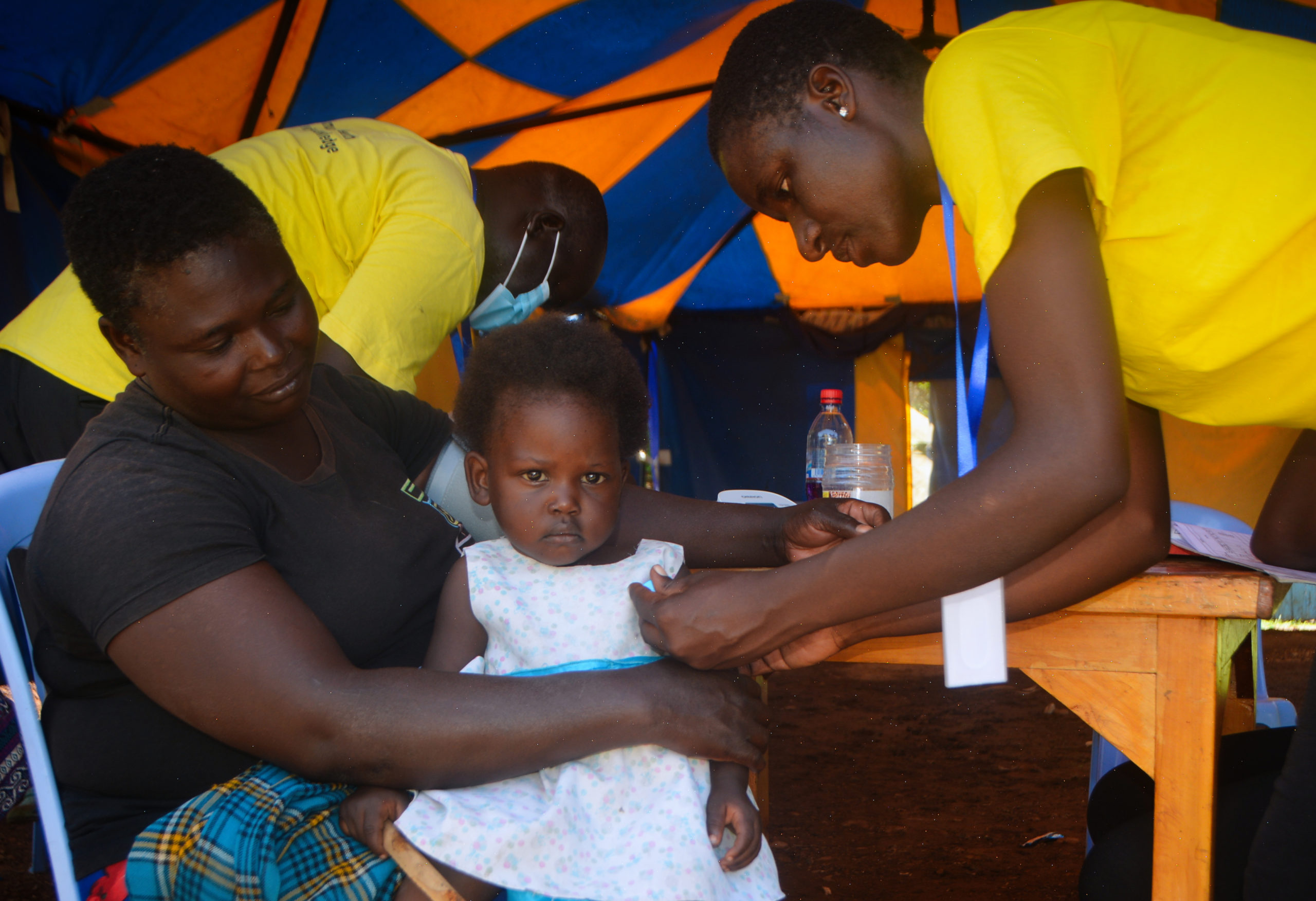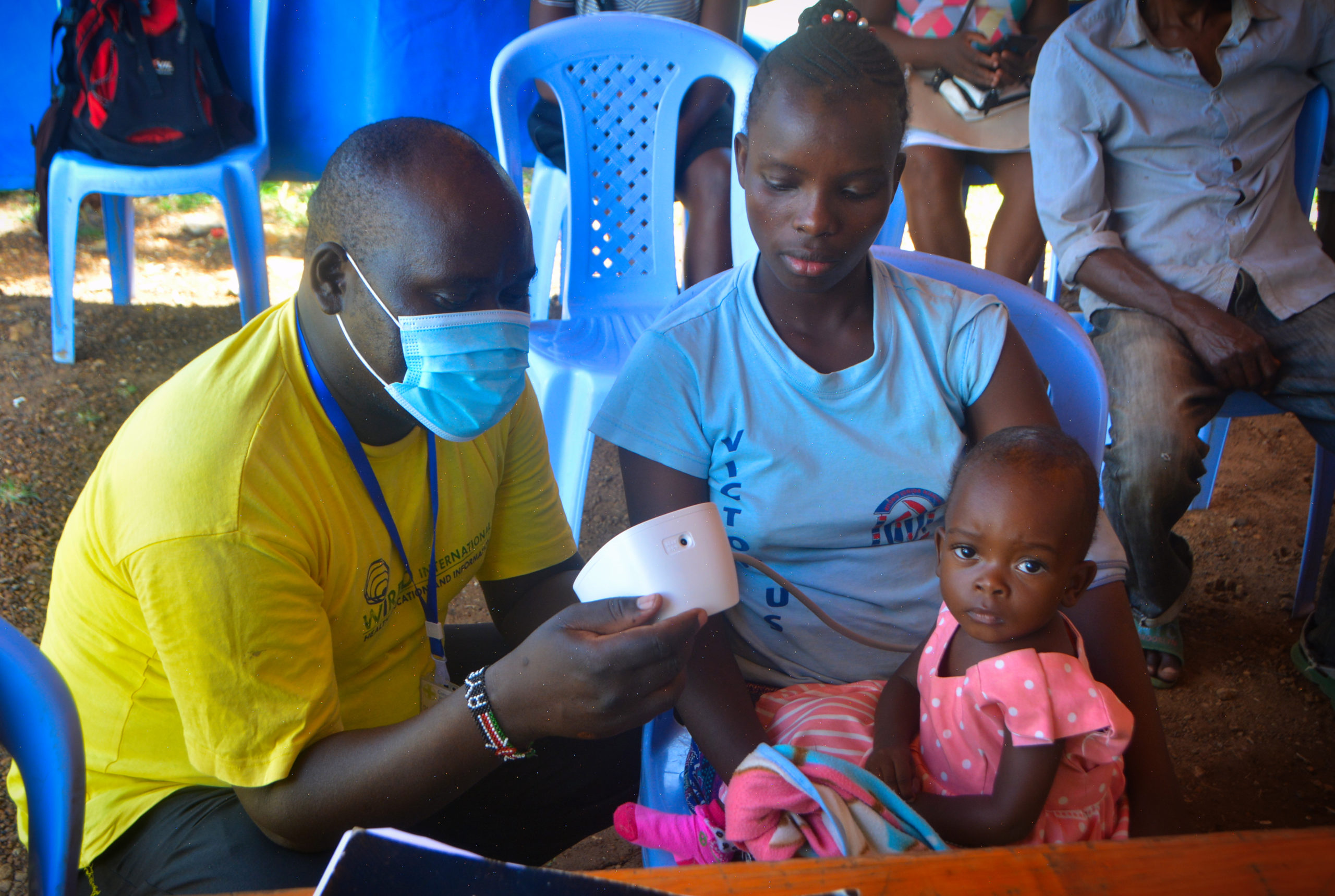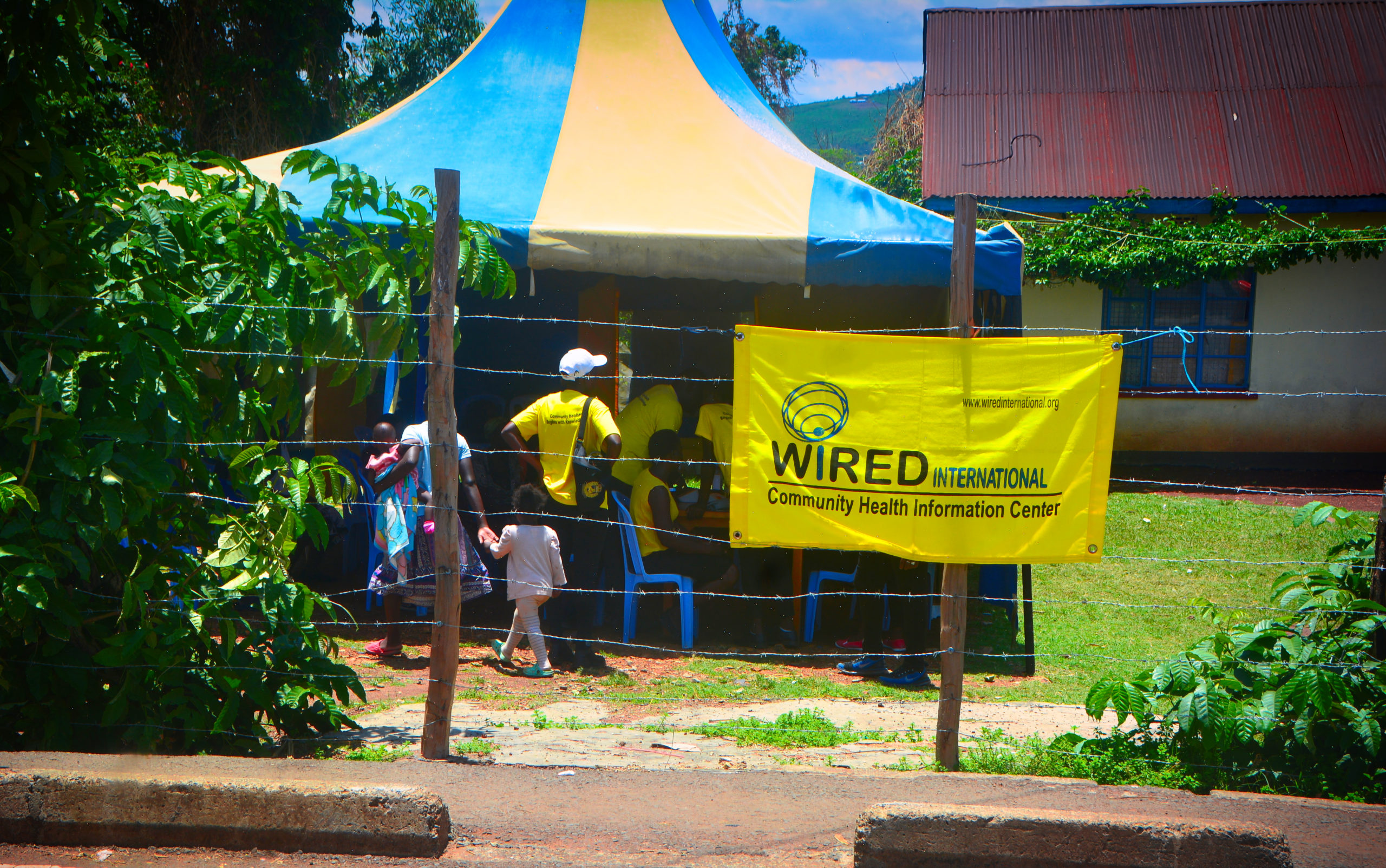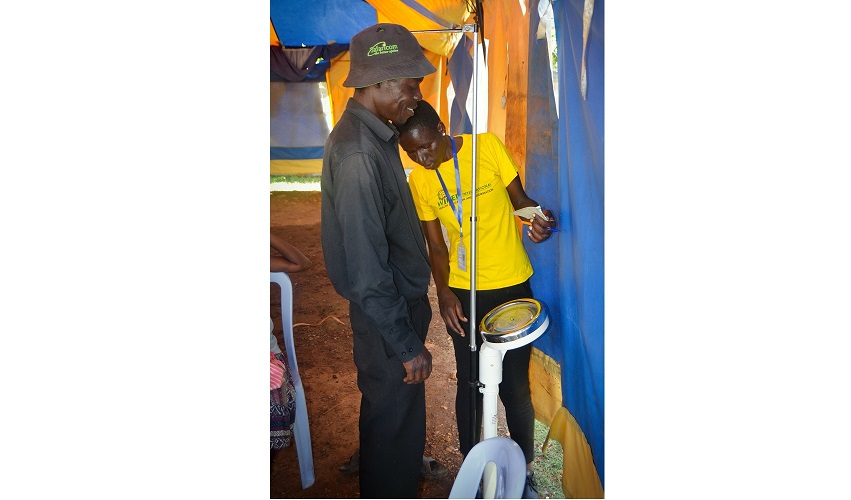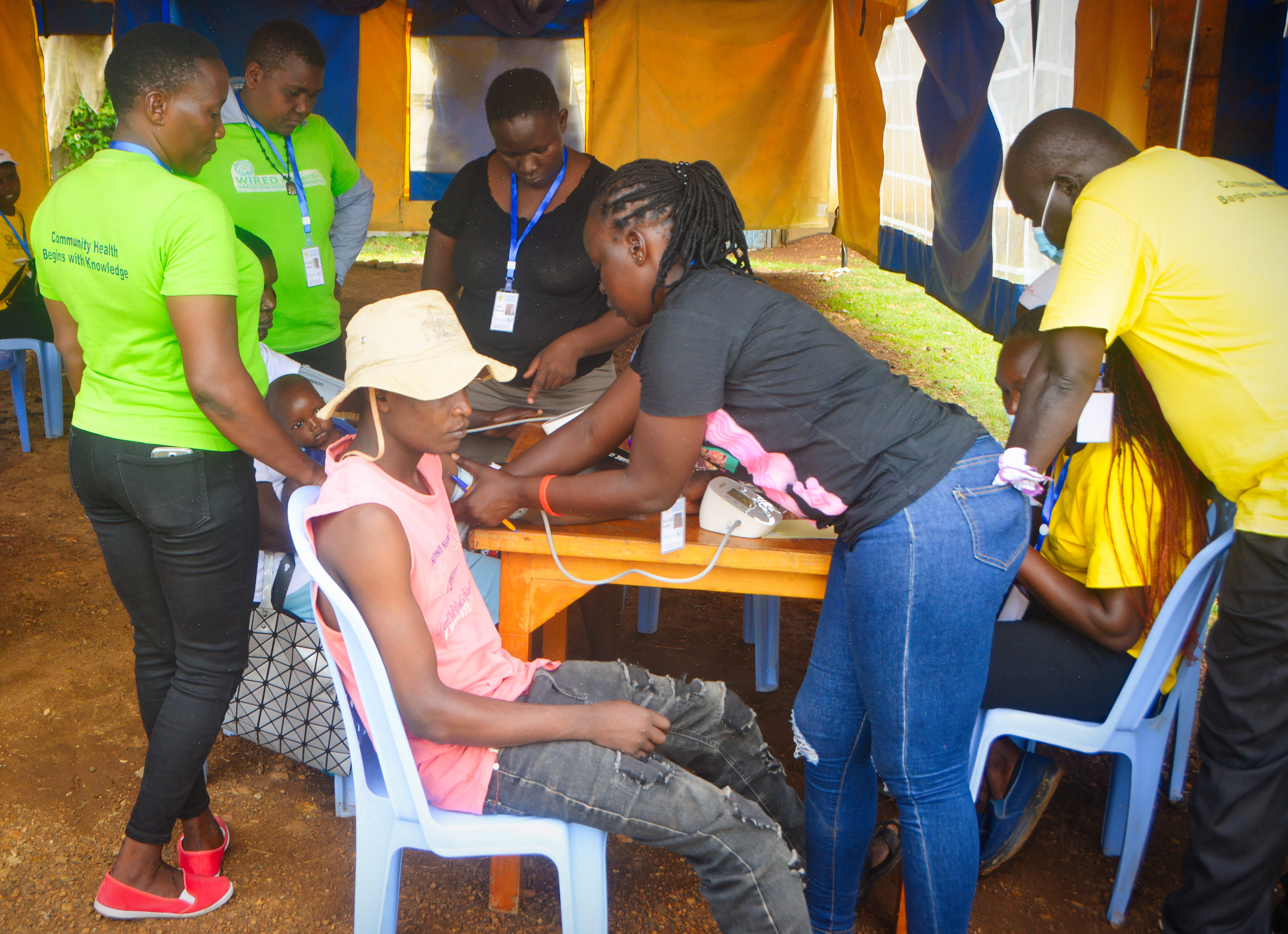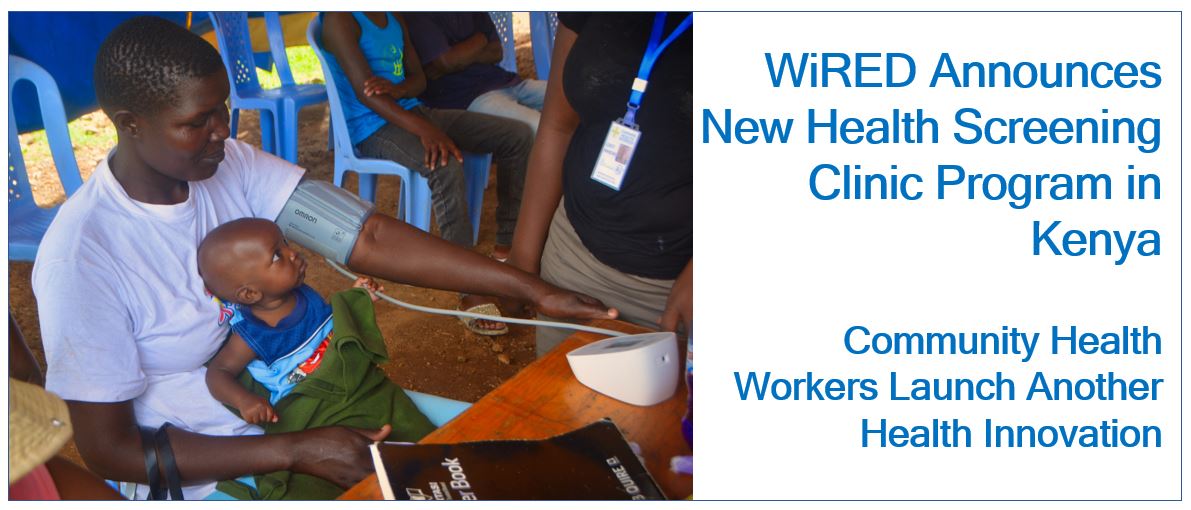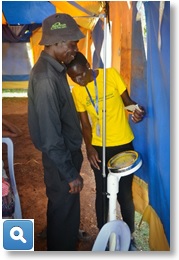By Allison Kozicharow; Edited by Elizabeth Fine
Editor’s note: This story reports a significant addition to the array of health programs WiRED’s community health workers bring to needy communities. We invite you to read the comments of staff members and CHWs and to look at the photos documenting the Health Screening Clinic.
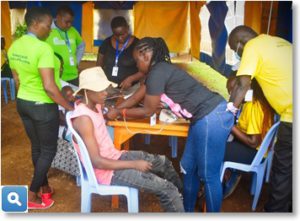 On March 24, 2023 WiRED International community health workers (CHWs) launched an innovative Health Screening Clinic (HSC) Program in the slums of Kisumu, Kenya.
On March 24, 2023 WiRED International community health workers (CHWs) launched an innovative Health Screening Clinic (HSC) Program in the slums of Kisumu, Kenya.
The HSC program takes basic health screening out of brick and mortar facilities into the field and enables CHWs to reach vulnerable people in the community who have few places to turn to for health care. These clinics help identify potential health problems early on, when they are most treatable. Further, the HSCs provide education about health and connect people with the resources that can assist them.
The inaugural clinic took place at Kamakowa Village, where the CHW team, supervised by a clinician, performed the following:
- Saw and treated 72 clients (50 female and 22 male).
- Measured basic vital signs.
- Gave basic eye exams.
- Tested nine people for HIV. (All tested negative.)
- Suspected eight people of having tuberculosis. Referred them to Pandipieri medical facility for testing.
- Tested blood pressure levels and found six people’s results to be high. Two of the six were already taking blood pressure medicine. Referred the remaining four people for further testing to confirm their status.
- Recorded all patient information onto an Excel database to use for comparative readings each year.
- Familiarized community members with the health services offered by the CHW Program.
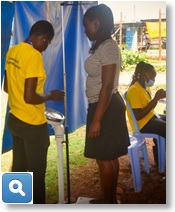 The HSCs are a new concept that adds to the regular practices of WiRED’s CHWs in Kenya, and these HSCs aren’t the first innovation for our CHW teams. Several years ago during the COVID pandemic, WiRED introduced the Vaccinator Training Program to prepare teams of health workers to help distribute vaccine. WiRED introduced training tools such as HealthMAP, that allows community members to download health education material to their smartphones. Further, WiRED’s CHW curriculum has enlarged the scope of training prescribed by the World Health Organization by developing material for health specializations (such as mother and child health, diabetes and HIV/AIDS). Finally, WiRED has introduced a rigorous continuing medical education component, required for all CHWs to keep their skills sharp and to expand their expertise.
The HSCs are a new concept that adds to the regular practices of WiRED’s CHWs in Kenya, and these HSCs aren’t the first innovation for our CHW teams. Several years ago during the COVID pandemic, WiRED introduced the Vaccinator Training Program to prepare teams of health workers to help distribute vaccine. WiRED introduced training tools such as HealthMAP, that allows community members to download health education material to their smartphones. Further, WiRED’s CHW curriculum has enlarged the scope of training prescribed by the World Health Organization by developing material for health specializations (such as mother and child health, diabetes and HIV/AIDS). Finally, WiRED has introduced a rigorous continuing medical education component, required for all CHWs to keep their skills sharp and to expand their expertise.
WiRED’s latest step to augment the CHW program begins not in Kenya but in war-torn Ukraine. In addition to providing the CHW core curriculum free of charge, we are working with critical care specialists to create a 10-part First Aid Critical Care block that prepares CHWs and others to address the medical challenges people face in a war targeting civilians. While we are developing this augmented program for Ukraine, it has great practical value to CHWs everywhere, and so we will offer it to all of WiRED’s CHW teams, including the well-trained and experienced team in Kisumu.
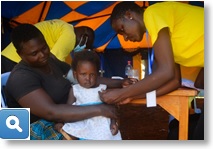 So far WiRED has brought our CHW program to countries in Africa, Latin America and Asia, and we continue to seek out innovative approaches to improve the adaptability of the CHW program globally. Launching the HSC program in Kenya is a significant step forward in helping CHWs provide the best possible health care for their communities.
So far WiRED has brought our CHW program to countries in Africa, Latin America and Asia, and we continue to seek out innovative approaches to improve the adaptability of the CHW program globally. Launching the HSC program in Kenya is a significant step forward in helping CHWs provide the best possible health care for their communities.
Comments about the new HSC from staff at WiRED and Pandipieri
The addition of Health Screening Clinics represents an important advance in the development of WiRED’s CHW program. I feel strongly that these screening clinics, held on a regular basis, can make a significant contribution to the improvement of health in the poorest communities. Through their training programs and clinical work, CHWs have had a remarkable impact on people who otherwise have no health care. These public screening sessions offer yet another opportunity for the health workers to identify ailing individuals and to detect health problems that might be brewing in the larger community.
—Gary Selnow, Ph.D., WiRED Executive Director
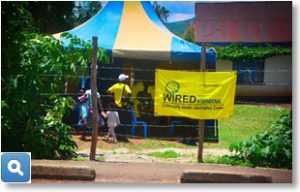 We are currently experiencing difficult times especially with the skyrocketing food prices and demonstrations which have affected people’s health seeking behavior, and it is against this background that the clinical outreach was mounted in Kamakowa village. The turnout was very impressive and the people underwent basic medical screening for high blood pressure, malaria, HIV, cough monitoring for suspect TB cases, weight and height measurements. The activity took over seven hours, and all persons who showed up were attended to. We had valuable support from the Ministry of Health Kisumu County, who supplied malaria and HIV test kits. We are looking forward to more outreach in the slums of Kisumu.
We are currently experiencing difficult times especially with the skyrocketing food prices and demonstrations which have affected people’s health seeking behavior, and it is against this background that the clinical outreach was mounted in Kamakowa village. The turnout was very impressive and the people underwent basic medical screening for high blood pressure, malaria, HIV, cough monitoring for suspect TB cases, weight and height measurements. The activity took over seven hours, and all persons who showed up were attended to. We had valuable support from the Ministry of Health Kisumu County, who supplied malaria and HIV test kits. We are looking forward to more outreach in the slums of Kisumu.
—Eric Ombuoro, Finance Officer, KUAP-Pandipieri
The outreach program started at exactly 9 a.m. and ended at 4 p.m. The venue for the outreach was Kamakowa village. Community mobilization was conducted by WIRED CHWs. Screening for health vitals was done in turns, and all of them had a chance to practice and be supervised by Albert Junior, who was the clinical officer. A few medical drugs were purchased only for the most vulnerable patients who attended and could not afford medication. Through WIRED, we purchased three blood pressure machines, five thermometers and three oximeters. The Ministry of Health supplied malaria rapid test kits and HIV test kits for free testing of malaria and HIV.
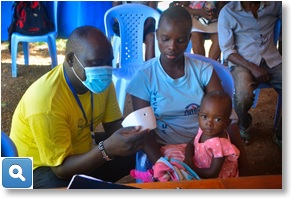 The clinical outreach not only helped in improving awareness of health issues but it also inspired skill development to address those issues. It was one of the innovative ways to reach out and influence a large audience to meet the needs of the most vulnerable people in the community. The activity helped in improving the health outcomes in the community by lowering the mortality rates because we encountered very sick patients who were unable to go to hospital because of lack of health insurance. Such outreach should continue in all the slum areas in Kisumu. Thanks to WIRED for the innovativeness.
The clinical outreach not only helped in improving awareness of health issues but it also inspired skill development to address those issues. It was one of the innovative ways to reach out and influence a large audience to meet the needs of the most vulnerable people in the community. The activity helped in improving the health outcomes in the community by lowering the mortality rates because we encountered very sick patients who were unable to go to hospital because of lack of health insurance. Such outreach should continue in all the slum areas in Kisumu. Thanks to WIRED for the innovativeness.
—Lillian Dajoh, CHW Coordinator
The move to clinical outreach is a good way to provide health services to our community. The test run on March 24 was successful. Community members were happy that health services came straight to them, minimizing time and cost. My take is that we should run the clinic twice a month out in the uppers slums of Kisumu.
—Jenipha Muhanji, Nurse and Administrator, Kuap-Pandipieri
Outreach services bring the community closer and helps the sick and vulnerable the most. They are often bedridden and cannot walk to health centers and lack the money to pay for medications. The clinic also gives CHWs a chance to demonstrate and continue practicing the skills they acquired during training. I look forward to more outreach within Kisumu communities.
—Albert Junior, Clinical Officer, Kuap-Pandipieri
Success by the Numbers!
WiRED CHWs began serving their people in March 2021. See how the numbers grew since then!
|
Year |
Average # people served per month |
Total # people served in the year |
|
2023 |
9,480 (based on figures reported through January, February and March) |
113,760 (projection by end of year) |
|
2022 (team expanded from 11 to 22 in October) |
7,084 |
85,002 |
|
2021 |
5,545 |
50,348 |
WiRED’s Community Health Worker (CHW) Program
WiRED’s 150-hour training course is based on World Health Organization guidelines and taught by local physicians and nurses. Course material can be studied online or downloaded to mobile phones. A rigorous final examination qualifies students for certificates of completion. The course covers:
- Basic health issues. Anatomy and physiology; infectious diseases prevention and control; non-communicable diseases, causes and prevention; health promotion; mental health
- Clinical issues. Vital signs and basic assessment; first aid and assessment; medications management; patient assessment
- Health Communications. Communication skills; teaching health topics; health surveillance skills
WiRED’s CHWs Observing Their Work in the Kisumu Slums
Sample CHW Testimonials from 2021-2023
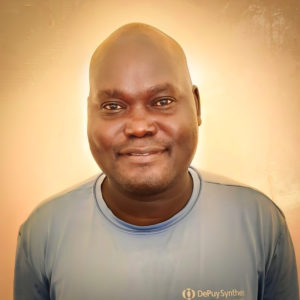
The weather in Kisumu has totally changed; there has been a lot of rain and flooding everywhere. This rain has brought a lot of stagnant water, which has helped mosquitos breed. During my training they emphasized how to use nets to help in preventing the spread of malaria. I also came across one of my participants who had malaria but was just using over-the-counter drugs. I referred the person to a hospital for the malaria test — which later turned out to be positive — and he was treated and given a prescription for the medication. I am happy the person is responding well to the medications.”
— CHW Daniel Ayieko
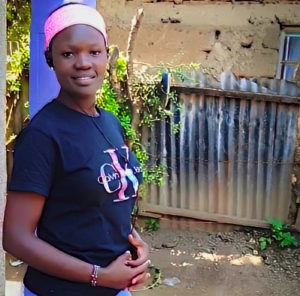 In my community different people suffer from different diseases which they don’t understand. One woman came to me who had a sexually transmitted disease but was treating it as a urinary tract infection, hence not ending the problem. I educated her about the causes, prevention and treatment and advised her to go to the clinic with her partner for checkup and treatment. I also said for her and her partner to abstain from sex outside their relationship to avoid infecting other people and getting new infections. After getting treatment she became well and was very happy.
In my community different people suffer from different diseases which they don’t understand. One woman came to me who had a sexually transmitted disease but was treating it as a urinary tract infection, hence not ending the problem. I educated her about the causes, prevention and treatment and advised her to go to the clinic with her partner for checkup and treatment. I also said for her and her partner to abstain from sex outside their relationship to avoid infecting other people and getting new infections. After getting treatment she became well and was very happy.
— CHW Liz Adhiambo
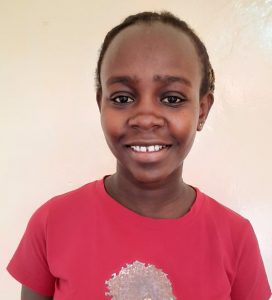 I have been going door to door with COVID-19 information, conducting education to women and men’s groups, helping fumigate informal settlements and distributing hand sanitizer and liquid soap. Because of health education and awareness outreach, I now see behavioral changes in our communities in that most people are practicing preventive measures. Reaching out to the community has been a lifetime blessing.
I have been going door to door with COVID-19 information, conducting education to women and men’s groups, helping fumigate informal settlements and distributing hand sanitizer and liquid soap. Because of health education and awareness outreach, I now see behavioral changes in our communities in that most people are practicing preventive measures. Reaching out to the community has been a lifetime blessing.
—CHW Juliete Omollo
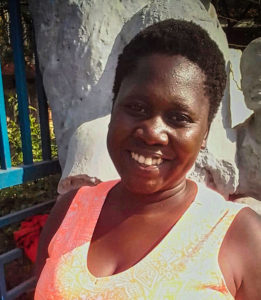 Many adolescent girls and young women suffer from what we call “menstrual poverty.” Menstrual poverty means that the women have no access to sanitary napkins, and so practice poor menstrual hygiene. As a CHW I decided to fundraise to purchase pads to give to the women. I always tell men in the community that menstruation is not a woman issue but a human issue, and we should all support our girls during this time of the month.
Many adolescent girls and young women suffer from what we call “menstrual poverty.” Menstrual poverty means that the women have no access to sanitary napkins, and so practice poor menstrual hygiene. As a CHW I decided to fundraise to purchase pads to give to the women. I always tell men in the community that menstruation is not a woman issue but a human issue, and we should all support our girls during this time of the month.
—CHW Bunnyce Atieno
 Teenage pregnancy has really affected many young people in our community due to peer pressure and wrong advice from each other. Many teens get pregnant not knowing the HIV status of the partner. After World AIDS Day, I educated teens on the importance of going for HIV tests, but the women said they can’t get their partners to go. Knowing that—and that some young women shared that they have numerous partners—I explained that PrEP (pre-exposure prophylaxis) can reduce the chance of getting HIV from sex or injection drug use. I encouraged the teens to consider PrEP if they can’t abstain. I made clear that when taken as prescribed, PrEP is highly effective for preventing HIV. I added that PrEP does NOT prevent pregnancies or STDs.
Teenage pregnancy has really affected many young people in our community due to peer pressure and wrong advice from each other. Many teens get pregnant not knowing the HIV status of the partner. After World AIDS Day, I educated teens on the importance of going for HIV tests, but the women said they can’t get their partners to go. Knowing that—and that some young women shared that they have numerous partners—I explained that PrEP (pre-exposure prophylaxis) can reduce the chance of getting HIV from sex or injection drug use. I encouraged the teens to consider PrEP if they can’t abstain. I made clear that when taken as prescribed, PrEP is highly effective for preventing HIV. I added that PrEP does NOT prevent pregnancies or STDs.
—CHW Tracy Agatha Achieng’
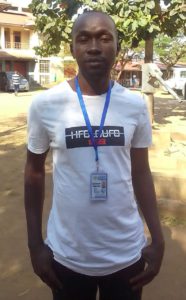 I led a session with young men ages 15 to 23 years in which we discussed drug abuse. I find that drug abuse is still rampant among young people, attributable to peer influence and easy access to drugs. Most interestingly, these young men don’t have a specific drug they are using. They mix all of them. The most common drugs include bhang (a type of cannabis), cigarettes, alcohol and cocaine. They are not aware of the risks and consequences of taking drugs, both short and long term, which I made them understand during our discussion. Proper sensitization is still needed to enable them to have adequate information on the dangers of drugs.
I led a session with young men ages 15 to 23 years in which we discussed drug abuse. I find that drug abuse is still rampant among young people, attributable to peer influence and easy access to drugs. Most interestingly, these young men don’t have a specific drug they are using. They mix all of them. The most common drugs include bhang (a type of cannabis), cigarettes, alcohol and cocaine. They are not aware of the risks and consequences of taking drugs, both short and long term, which I made them understand during our discussion. Proper sensitization is still needed to enable them to have adequate information on the dangers of drugs.
—CHW Zachary Omondi
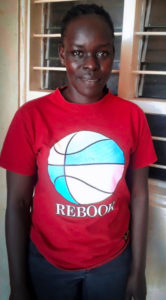 As I was making my rounds in the field I came across a household where all the children had chicken pox. The mother was not willing to take her children to a clinic for treatment. I counseled her, and finally she said she would bring them to the medical facility. After two days I followed up. After the clinic visit the children were doing so well that the mother promised to seek treatment for illness in the future because her children’s well-being was important.
As I was making my rounds in the field I came across a household where all the children had chicken pox. The mother was not willing to take her children to a clinic for treatment. I counseled her, and finally she said she would bring them to the medical facility. After two days I followed up. After the clinic visit the children were doing so well that the mother promised to seek treatment for illness in the future because her children’s well-being was important.
—CHW Millicent Randiki
